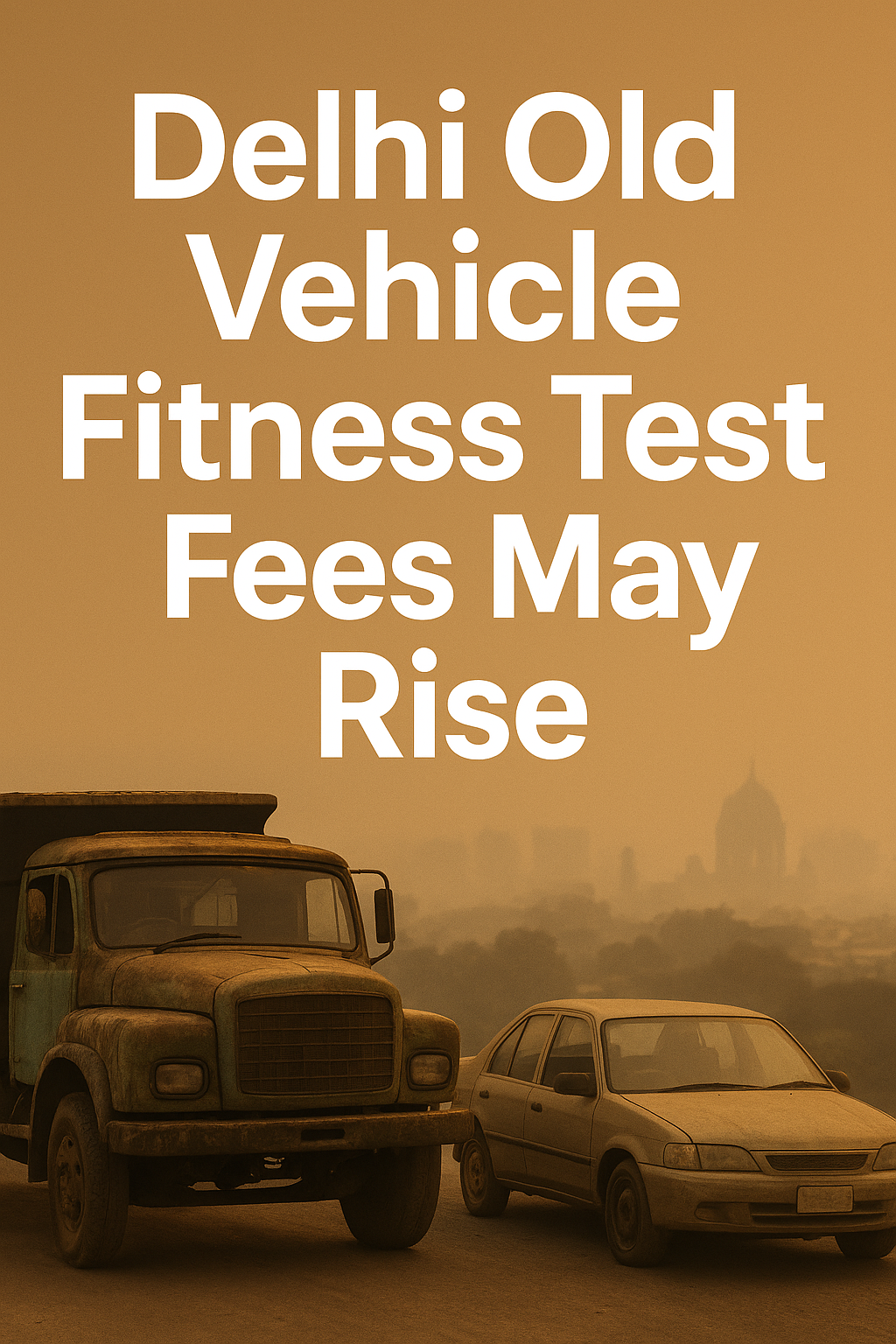Why Old Vehicles Are Back in the Spotlight
Delhi’s fight against pollution is once again zeroing in on ageing vehicles. The central government is weighing a proposal to sharply raise the fitness test fees for older cars and commercial vehicles. If approved, this could make keeping a vehicle beyond 15–20 years far more expensive than before.
The move is aimed at discouraging the use of older, more polluting vehicles that contribute disproportionately to Delhi’s air quality crisis. But the steep costs being discussed have already raised eyebrows among motorists and transporters.
What the Proposal Says
- For private vehicles older than 20 years: fitness test fees could range from ₹2,000 to ₹6,000.
- For commercial vehicles older than 15 years: charges may climb as high as ₹25,000, particularly for heavy trucks and buses.
- These rates are a significant jump from current charges, which are much lower.
The Ministry of Road Transport and Highways (MoRTH) has confirmed that such fee hikes are under consideration but has not finalized timelines or enforcement details.
Why the Government Wants Higher Fees
The logic is simple: the older the vehicle, the higher the emissions. Even well-maintained cars and trucks tend to pollute more than newer models equipped with modern emission-control technology.
By raising the cost of keeping older vehicles on the road, the government hopes to:
- Push owners towards scrapping ageing vehicles.
- Encourage the purchase of cleaner, newer models.
- Support India’s larger environmental and public health goals.
A senior transport official noted, “It’s not just about revenue. It’s about nudging citizens toward responsible choices for the environment.”
What’s Confirmed vs. Still Under Debate
Confirmed facts:
- The proposal is being actively reviewed by MoRTH.
- Fee slabs under discussion are ₹2k–₹6k for private vehicles, and up to ₹25k for heavy commercial vehicles.
- The intent is explicitly tied to pollution control.
Unclear points:
- Exact rollout timeline or whether the change will be phased in.
- How “fitness” will be tested and what criteria will be applied.
- Whether certain vehicles (e.g., vintage cars, special-purpose vehicles) will be exempt.
- Whether states will have flexibility in enforcement.
How This Could Impact Vehicle Owners
For private car owners, the proposed hike may feel like a financial penalty for holding on to an old but functional vehicle. In Delhi, where 10- and 15-year age limits already apply for diesel and petrol cars respectively, this move may make little difference for most households.
For commercial operators, however, the impact could be far greater. Trucks and buses are often run well past 15 years, especially by smaller transporters who cannot afford replacements. A ₹25,000 fee could be a heavy burden, potentially pushing some operators out of business.
Environmental Need vs. Economic Reality
On one side, the proposal makes sense in Delhi’s pollution battle. Older trucks and buses are notorious for black smoke and toxic emissions. On the other, there is a risk of disproportionately hurting small business owners and low-income groups who rely on ageing vehicles for their livelihood.
A balanced approach—such as phased implementation, targeted subsidies for scrapping, or exemptions for certain categories—may be necessary to avoid backlash.
FAQs
What is the proposed new fitness test fee for old vehicles in Delhi?
The government is considering raising fees to ₹2,000–₹6,000 for private cars over 20 years old and up to ₹25,000 for heavy commercial vehicles over 15 years.
Why is Delhi planning to increase fitness test fees for old vehicles?
The aim is to discourage the use of ageing, polluting vehicles and push owners toward scrapping them or switching to cleaner, newer models.
When will the higher fitness test fees be implemented?
No date has been finalized. The Ministry of Road Transport and Highways (MoRTH) is reviewing the proposal, and a phased rollout may be considered.
Will vintage or special vehicles be exempt from the new fees?
The exemption criteria are not clear yet. Vintage or classic cars could potentially be exempt, but this has not been officially confirmed.
How will this impact commercial truck and bus owners?
The steep ₹25,000 fee could heavily burden small transport operators who often rely on ageing trucks and buses. It may also increase logistics costs in the long run.
What alternatives are being discussed to balance the impact?
Options like scrapping subsidies, phased implementation, or targeted exemptions are being considered to ease the financial strain while still achieving environmental goals.

